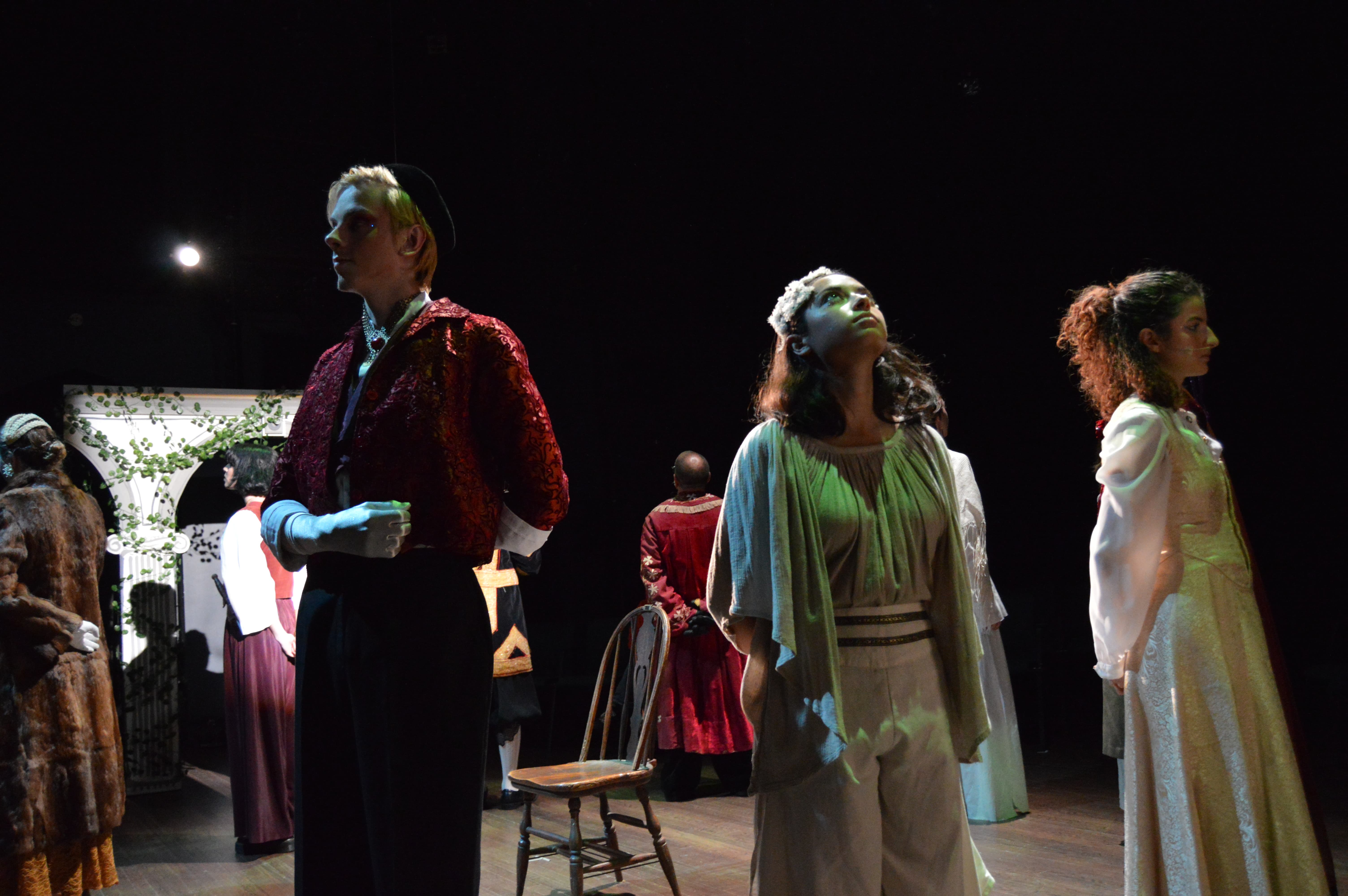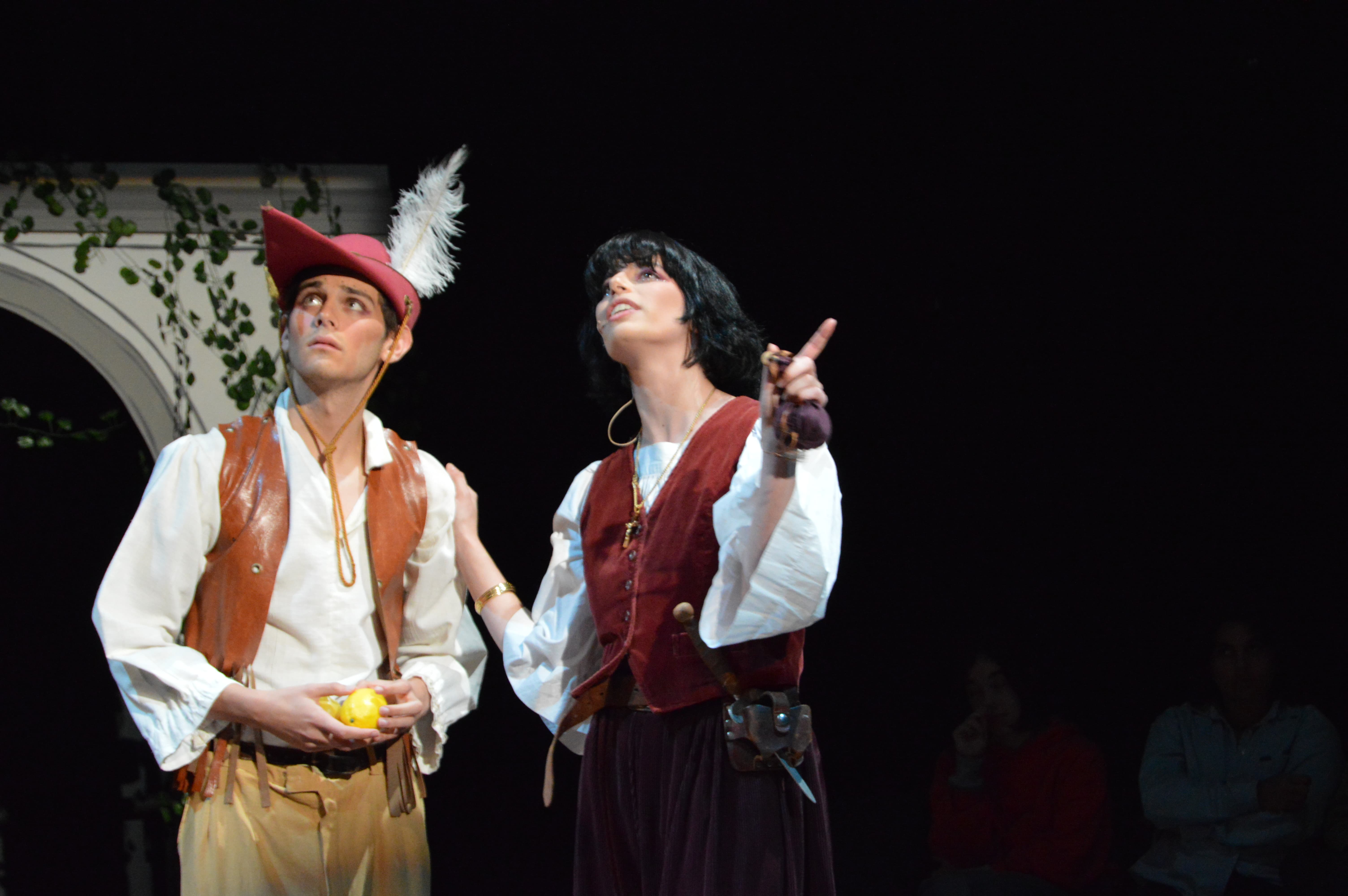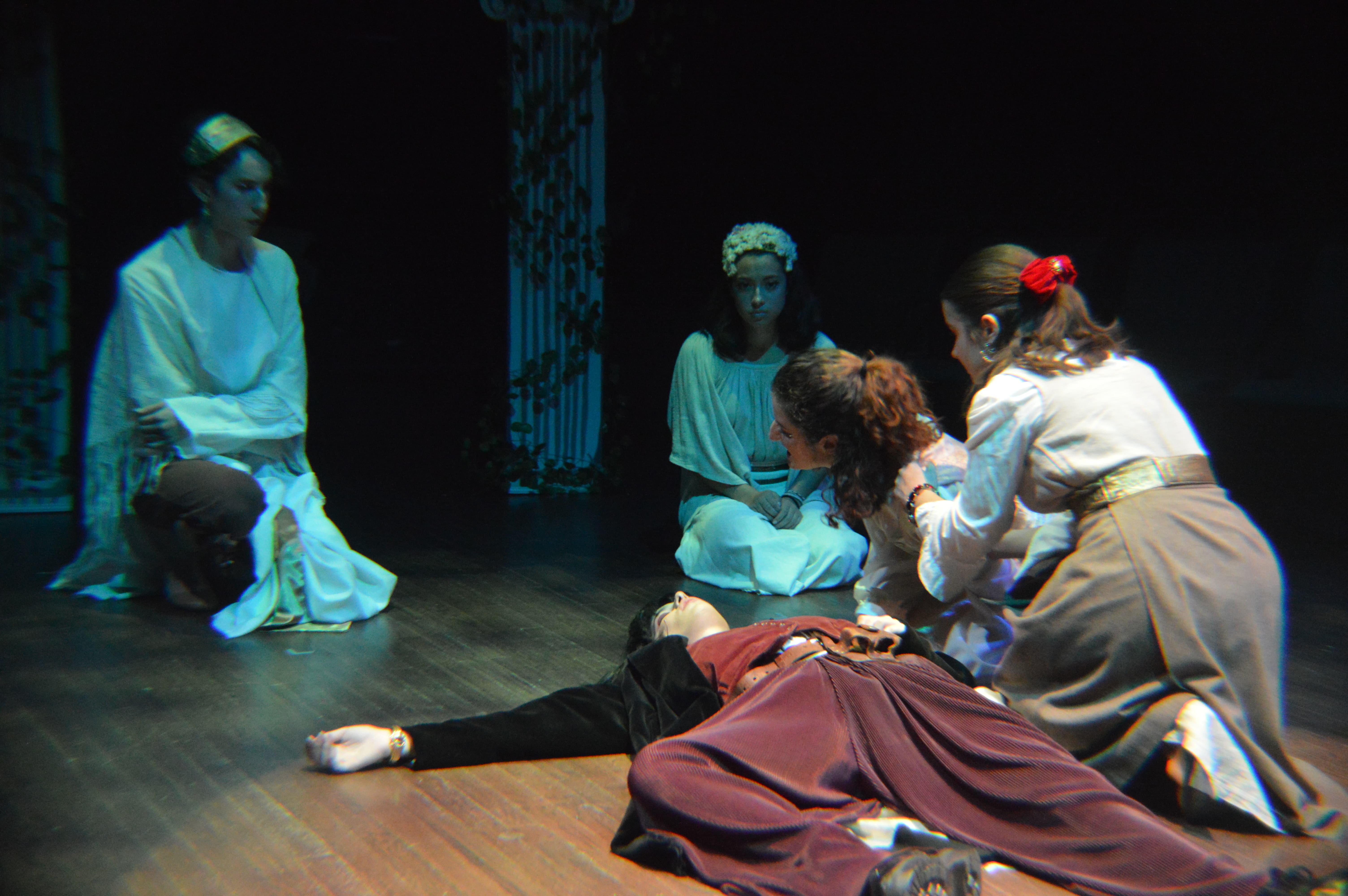
c/o Sarah Linsly
This review contains spoilers for “The Masquerade.”
“The Masquerade,” a new Shakespearean-style play, written and directed by Liv Snow ’25 and co-directed by Owen Wiley ’25, was performed in the Patricelli ’92 Theater on Friday, Nov. 11 and Saturday, Nov. 12. The play follows the complex relationships between two noble families, the de Bossis and the Pietros, in sixteenth-century Italy, as they attempt to arrange a marriage between their children Claudio and Clara, who cannot stand the sight of each other. In a series of witty, surprising, and sometimes dire twists and turns, “The Masquerade” explores wealth and status, family and inheritance, and love and death.
Snow wrote “The Masquerade” in the Spring of 2021 as her senior experience project in high school, between the end of AP exams and the last day of school. Snow composed five acts of iambic pentameter, complete with all the necessary components for a Shakespearean play: fairies, feuding families, mistaken identities, and a tragic ending.
“It’s been…surreal to have people take my words and do something with them and feel something with them,” Snow said. “That’s just a really cool thing as a writer, to have someone be impacted by something that you made up in your brain. Getting to see people use my words and keep them in their brain and make acting choices…is really rewarding…. It feels like the movie that I’ve had in my brain when I was writing this is real.”
When I took my seat in the theater, I was immersed in the world of “The Masquerade” before any actors even walked onstage. The set was simple—two pillars covered in vines and a few chairs that moved on and offstage—yet effective. It shifted focus to the actors and the creative ways they moved throughout the space. The play’s blocking was especially impressive, performed in the round. The actors’ movements were dynamic and compelling; they undoubtedly took full advantage of having the audience on all four sides.
“I’ve really enjoyed blocking in the round,” Wiley said. “Apparently it’s supposed to be harder. Personally, I think it’s easier than blocking a straight stage play…. I feel like in the round it’s much more obvious when there are problems…and I feel like…I’ve gotten better at recognizing when something doesn’t work and hopefully finding the correct solution to it.”
In the prologue, the fairies (Yumiko Takahashi ’25, Hannah Sodickson ’26, Isa Cino ’26, and Jason Tey ’26) introduce the show as the actors walk onstage from four different entrances, from the four corners between rows of the house. The closeness of actor and audience in these entrances, frequently used throughout the play, further immersed the audience in the magic of the show.
In addition to introducing the production, the fairies also introduce flower language, a prominent symbol throughout the play. Flower language was used by Shakespeare and his contemporaries as a way to signal important themes and messages, and Snow adopts this unique secret creatively in her work.
“In the prologue of my show, I mentioned irises as a way to signal the audience [to] pay attention to the flowers,” Snow said. “If you take away the entirety of the script, and you just pick out whatever flowers are mentioned by name, they actually illustrate the plot from beginning to end.”

c/o Sarah Linsly
Another important symbol throughout the play is fruit. Fruit is used intentionally in several ways, one of which is as comical fodder for Claudio de Bossi (Lena Weiman ’25). Claudio is a bit of a womanizer, boisterously flaunting that he knows how many women feel (a clever pun) to his betrothed, Clara Pietro (Maya Gray ’25), who wants nothing to do with him.
“I think that everyone likes a good, old-fashioned, Shakespearean sex joke, and there’s a lot of those, and I really appreciate that,” Weiman said. “That’s my favorite part: ‘the melons, those supple fruits.’”
Fruit is also essential to Frederik (Adam Wilan ’26), a fruit seller who is madly in love with Virginia de Bossi (Zoё Holbo ’24). Despite the reckless abandon with which Federick loves Virginia, he cannot have her hand in marriage, both because he is of low status and because Virginia is hopelessly in love with Clara. Snow deftly plays off of our modern definition of a fruity man when writing Federick’s declaration of love.
“Consider me dunce, for it is only you. / Just kiss me once, and I shall turn thee mine. / Come now, and taste the sweet offerings of / The fruitiest of fruit men,” Federick proclaims.
Finally, Snow includes apples throughout “The Masquerade” to subtly reference the Apple corporate policy that when their products appear in films, they cannot be in the hands of the antagonist. Snow uses this trope to slyly foreshadow the play’s ending.
“My way of inserting that into [“the Masquerade”] is that every character references or comes into contact with an apple…except for the girl who ends up killing [someone] at the end,” Snow said. “She actually is offered an apple, and she rejects it.”

c/o Sarah Linsly
At the end of the play, Clara kills Claudio, not realizing that he was the mysterious, masked stranger she fell in love with at the masquerade. She becomes aware of this fact after he is dead, when the mourning Virginia tells Clara of her mistake. Clara then decides that she would rather be dead than be separated from her true love, and the fairies transform her into a seed, so that she can enter the earth and be reunited with Claudio. Virginia, devastated after losing both her brother and her lover, kneels over the two bodies, heartbroken. Holbo’s poignant performance was phenomenal and painful, and I felt their heartache as if it were my own.
“One of my favorite Shakespeare plays is Hamlet, and I like the character of Horatio, which is good news for me,” Holbo said. “My favorite scene is the final scene…going over two dead bodies and just crying my heart out…. Virginia does not have a good play, but [it’s] so much fun.”
Despite its tragic ending, “The Masquerade” is filled with humorous moments that breathed life into the space and filled the audience with laughter. From the hilariously gossipy priest Antonio (Cyrus Berger ’24) whose impeccable sense of comedic timing practically had me in stitches, to the dramatic duel between Signore de Bossi (Quincy Segal ’26), Signora de Bossi (Mae Wrigley ’26), Signore Pietro (Sam Hilton ’25), and Signore de Bossi (Oluchi Chukwuemeka ’26) in which each family discovers the poverty of the other, “The Masquerade” was packed with funny lines and scenes that complemented its more serious ones.
Though “The Masquerade” was performed seamlessly, no play is put on without overcoming its hurdles. The show faced frequent issues with the departure of cast members, including one who quit during the show, right after the prologue. By the conclusion of the last performance, only three members of the show’s original cast were still involved. However, the cast and crew skillfully adapted to the last-minute change. Snow donned the actor’s costume and went onstage with her script in hand, impressively embodying the principle of “the show must go on.” Her line deliveries were so flawless that I never would have known that she was new to the role if she wasn’t carrying her script. Snow proved that, aside from being a fantastic scriptwriter, co-director, costume designer, advertising designer, and shop assistant, she is also a captivating presence onstage.
In the end, despite screaming competitions between enraged characters, quarreling enemies turned lovers, and real-life obstacles, the cast and crew were able to overcome all and put on a remarkable performance because, though it may sound cheesy, of the closeness between them. Though they are masters of fighting onstage, the friendship that tied them together off-stage was clear.
“This is my first theater production at Wesleyan, and it’s been a really nice process,” Segal said. “Everyone is super chill and I enjoy spending time with the cast and the directors…. It feels a lot less intense ’cause I’m working with all students and…the process has been really fun.”
Kat Struhar can be reached at kstruhar@wesleyan.edu.
Comments are closed